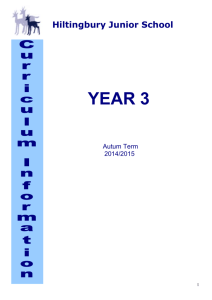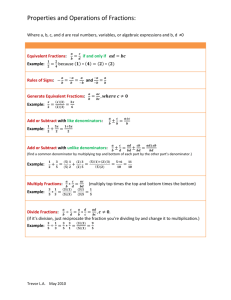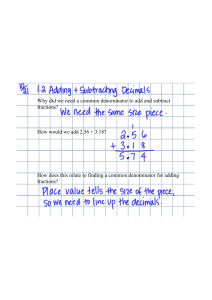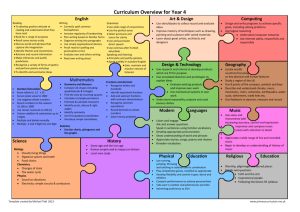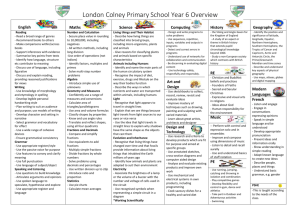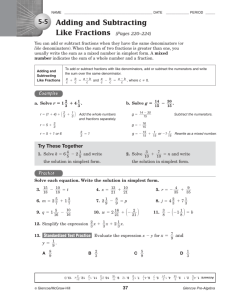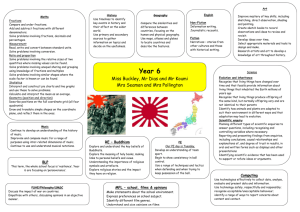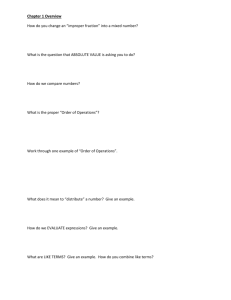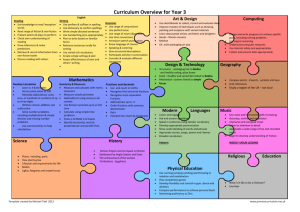YEAR 3 - Hiltingbury Junior School
advertisement
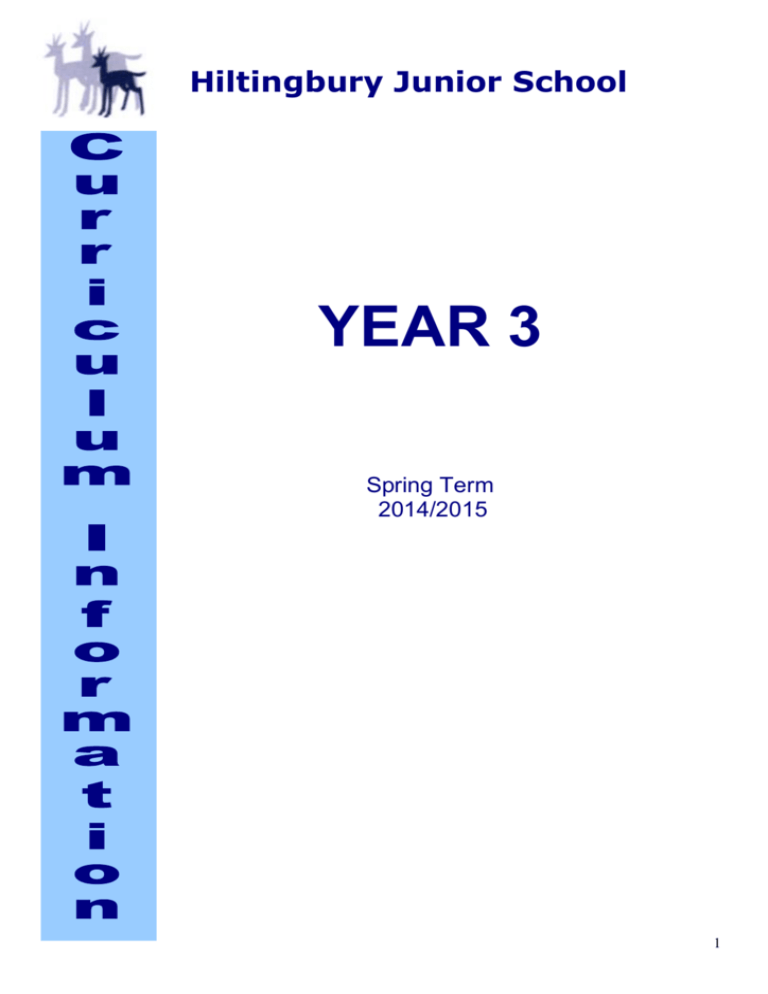
Hiltingbury Junior School YEAR 3 Spring Term 2014/2015 English English 1 English During the Spring Term, Year 3 will be focusing on: Instructional writing - using Roald Dahl’s ‘Georges Marvellous Medicine’ as a stimulus for creating our own marvellous medicines; 500 Word Stories - using the BBC 2 radio competition for inspiration; Myths – focusing on creation and phenomena myths from other cultures; Author study – exploring the picture books written and illustrated by Anthony Browne; Recounts – diaries and newspaper recounts Non-chronological reports In particular the children will learn about: Using spoken language to develop understanding, through speculating, hypothesising, imagining and exploring ideas Speaking audibly and fluently with an increasing demand of standard English Participating in discussions, presentations, performances, role play and debates. Writing in sentences and using correct punctuation In narrative, creating settings, character and plot The format of fiction and non-fiction texts Verbs, adverbs and adjectives – using relevant strategies to build their vocabulary Writing for an audience Organising paragraphs around a theme Using conjunctions Apostrophes for possession and omission Assessing the effectiveness of their own and others’ writing and suggesting improvements Editing and revising their work Strategies for reading including prediction, skimming and scanning, inference and deduction Reading for a range of purposes Increasing familiarity with a wide range of books, including myths and short stories Listening to and discussing wide range of fiction, poetry, non-ficton and reference books Examples of work produced during this part of the curriculum: Writing a recipe, a marvellous medicine and directions to find treasure An independent short story A phenomena myth Diary and newspaper recounts Letter to an author A non-chronological report The children have daily independent reading opportunities as well as group reading activities, which take place on a weekly basis – reading and discussing texts, expressing opinions and preferences. Children have opportunities to develop speaking and listening skills through a variety of activities, including drama in the context of English and other areas of the curriculum. 2 Handwriting skills are taught and practised using the Nelson handwriting style. The children will have the opportunity to advance through our Master Scribe handwriting journey. On reaching scribe level, the children will be given a handwriting pen to write with. Children achieving master scribe level will be awarded a fountain pen in their house colour. Children will be learning spelling rules and patterns throughout the term; each rule will typically be worked on for a one or two-week period. Children will be required to take home up to ten words a week to learn and each child has a home spelling book where their spellings are recorded. We encourage children to practise their spellings daily (5 to 10 minutes). Children will be tested weekly on their spellings. The children will be encouraged to to identify their own spelling mistakes in written work and will have practise in using dictionaries and thesauruses. Mathematics Every child will take part in a daily mathematics lesson and will spend time on a range of activities and tasks, including mental maths, group work and investigations. These will be interactive, with children explaining to each other and their teacher, how they are solving calculations and investigations. Much of the time the class will work as one group on the same topic. During the maths lesson, children will have the opportunity to to work in pairs and groups in order to learn from each other, as well as solving problems independently. Children need to be able to do simple addition, subtraction, multiplication and division in their heads before they go on to written methods for more difficult questions. If your child can understand how to use numbers without writing them down this is a big help in all kinds of numeracy activities. Your child will learn several ways of doing mental tasks. Please don’t try to teach written methods unless you know that these methods are the ones your child is learning in school. If in doubt, check with the teacher or the written strategies document that can be found on the school website - 'our curriculum' link. The daily maths lesson will help the child become strong in all the skills of numeracy. Throughout Year 3 your child will be tackling these mathematical skills: Read, write and order numbers to at least 1000; know what each digit represents Identify, represent and estimate numbers using different representations Compare and order numbers up to 1000 Count from 0 in multiples of 4, 8, 50 and 100; find 10 or 100 more or less than a given number Identify, represent and estimate numbers using different representations Add and subtract numbers mentally, including a 3-digit number and ones; a 3-digit number and tens and a 3-digit number and hundreds Add and subtract nos with up to 3 digits, using formal written methods of columnar addition and subtraction Add and subtract amounts of money to give change, using both £ and p in practical contexts Solve problems, including missing number problems, using number facts, place value, and more complex addition and subtraction Count on or back in tens or hundreds from any two or three digit number 3 Measure, compare, add and subtract: lengths (m/cm/mm); mass (kg/g); volume/capacity (l/ml) Interpret and present data using bar charts, pictograms and tables Solve one-step and two-step questions [for example, ‘How many more?’ and ‘How many fewer?’] using information presented in scaled bar charts and pictograms and tables Recognise and show, using diagrams, equivalent fractions with small denominators Recognise, find & write fractions of a discrete set of objects: unit fractions & non-unit fractions with small denominators Recognise and use fractions as numbers: unit fractions and non-unit fractions with small denominators Compare and order unit fractions, and fractions with the same denominators Add and subtract fractions with the same denominator within one whole [e.g. 5/7 + 1/7 = 6/7 ] Write and calculate mathematical statements for × and ÷ using the multiplication tables that they know, including for 2-digit nos times 1-digit nos, using mental and progressing to formal written methods Solve problems, including missing number problems, involving × and ÷, including positive integer scaling problems and correspondence problems in which n objects are connected to m objects. Draw 2-D shapes and make 3-D shapes using modelling materials; recognise 3-D shapes in different orientations and describe them Recognise angles as a property of shape or a description of a turn Identify right angles, recognise that two right angles make a half-turn, three make three quarters of a turn and four a complete turn; identify whether angles are greater than or less than a right angle Tell and write the time from an analogue clock, including using Roman numerals from I to XII, and 12hour and 24-hour clocks Estimate and read time with increasing accuracy to the nearest minute; record and compare time in terms of seconds, minutes and hours; use vocabulary such as o’clock, a.m./p.m., morning, afternoon, noon and midnight Know the number of seconds in a minute and the number of days in each month, year and leap year Compare durations of events [for example to calculate the time taken by particular events or tasks]. Science Science is taught weekly in half termly units. Animals including humans This is a new unit in the national curriculum for year 3. The children will learn that animals, including humans, need the right types and amount of nutrition, and that they cannot make their own food; they get nutrition from what they eat. They will be taught that to stay healthy, we must eat a balanced and varied diet. The main functions of the human skeleton will be taught - that bones and muscles are needed for movement. The children will identify similarities and differences between the skeletons of humans and a variety of animals. The benefits of exercise in maintaining a healthy lifestyle and the immediate and long-term effects of exercise on the body will also be studied. Forces and Magnets In this unit, the children will compare how things move on different surface. They will notice that some forces need contact between two objects, but magnetic forces can act at a distance. They will observe how magnets attract or repel each other and attract some materials and not others, in addition to 4 comparing and grouping a variety of everyday materials together on the basis of whether they are attracted to a magnet. They will identify some magnetic materials and describe magnets as having two poles. Finally the children will predict whether two magnets will attract or repel each other, depending on which poles are facing. We will be visiting Paultons Park in order to understand how forces and magnets are used in rollercoasters. Geography In their geography lessons, the children will be cover the skills of: Locational knowledge – They will be taught simple locational knowledge about the wider world this term. Human and Physical Geography - They will have opportunities to describe places and features using simple geographical vocabulary. In addition, they will identify similarities, differences and simple patterns. Geography Skills and Fieldwork – In this term, the children will investigate places and environments through questioning, observing and using simple maps and images. France In the spring term, the children will extend their knowledge and understanding beyond the local area, to study a place within Europe – France. The children will initially locate and name the main continents and oceans of the world, then focus in upon locating Europe and France and Paris using simple maps. The children will explore the physical and human features of selected regions of France and will begin to compare places and environments in France. Transportation of people and resources will be studied. The children will gain an understanding of why people visit France as tourists. Art and Design We aim to develop a range of practical skills to encourage an imaginative response and a willingness to experiment with different media. The main units of work will concentrate on sketching, painting and collage. Through the window – a collage of a Paris landmark Pointillism Monet Design and Technology Children develop their designing and making skills through one main Design and Technology project each term. 5 In each design and technology unit the children will be taught to design, make (using a range of tools safely) and evaluate. In the spring term, the children will design, make and evaluate a healthy French recipe. Computing In the Spring term, the children will cover the following key ICT skills: Digital Literacy – Know that ICT enables access to a wider range of information and tools to help find specific information. Use of the Internet – Navigate a web page to locate specific information. In the first half of the spring term, the children will be the taught the skills to enable them to undertake effective web research. This will be given a meaningful context through researching for an individual French project. In the second half of the spring term, the children will be taught desktop publishing. Physical Education The children will have opportunities to participate in Games, Gymnastics and Dance. Our games lessons develop the foundation for games such as netball, football, and hockey to enable them to become physically confident in a way that supports their health and fitness. In the second half of the spring term, the children will develop skills in either cricket or rounders. We have indoor PE lessons in the hall once a week. The units of work are: Traditional French dancing Creative dance – Earth, Wind and the Sun In both dance units, the children will be taught to perform dances with an awareness of rhythmic, dynamic and expressive qualities For all these activities children must bring to school and wear the appropriate kit. For your information lessons occur on these days: Outdoor Games – Thursdays (tracksuit bottoms can be worn during colder months and a warm fleece) Indoor PE –Tuesdays Music 6 Pupils’ understanding and enjoyment of music is developed through activities that bring together performing, improvising and composing, listening and appraising. Children will undertake these activities within different units of work, which focus on a variety of musical skills. French folk songs – singing in a simple round, recognising and using simple notated rythms, composing a group rap, improving the rap, performing and evaluating the rap. Sans Scien – recognising different combimations of layers in music, identifying a range of percussion and non-percussion instruments, identifying steps, leaps and repeated notes in melodies, beginning to understand 2,3 and 4 metre and how ryhthms fit into a steady beat, understanding dynamics and tempo Religious Education In our Religious Education lessons, the following key skills are covered for each topic: Enquire – The children will describe, in simple terms, key concepts that are common to all human experience. Contextualise – They will describe ways in which these concepts are expressed in the context of the religion being studied. Evaluate – The children will evaluate the concepts by describing their value to believers. Apply – Finally, they will identify simple examples of how their responses relate to their own lives and those of others. The concepts covered this Spring term are: Symbols – in the context of Hinduism and Christianity Loyalty – in the context of Easter PDL (Personal Development and Learning) In their PSHE lessons, the children will learn about: Health and Wellbeing – The children will learn how to develop healthy lifestyles. Relationships – They will being to identify some factos that affect how people think and feel. Living in the Wider World – The children will begin to understand why and how rules are made and enforced and why different rules are needed in different situations. This term this will be delivered through the following two themes: Making friends – thinking about being a friend, knowing what helps and hinders friendships, being able to initiate friendships and considering ways of resolving differences. Keeping Safe in School – thinking about what bullying is and how to deal with it; know safety rules relating to medicines, alcohol, solvents and illegal drugs (at seven/eight age appropriate level); considering how to contribute to making the school environment a safe place. 7 French The children will be introduced to the language of French. They will read aloud familiar sounds, phonems and words. In addition, the children will copy some familiar, simple words. They will also speak in French, using the correct pronounciation and French accent. They will be delivered through a focus on the following: Revision of greeting, numbers and colours Classroom phrases Animals Months of the year and days of the week French café vocabulary Wacky Week Each term, the children will have the opportunity to choose a theme and be involved in shaping the curriculum learning for a week. Last term the children in Year 3 chose to learn about Space and Aliens. This term, the children have chosen Superheroes! Visits/Visitors In February we will visit the Southampton Art Gallery. In March, we have a new trip to Paultons Park to support our work on forces and magnets in science. During Year 3 children benefit greatly if parents are able to support their practising of spelling, reading, times tables and number bonds. 8
